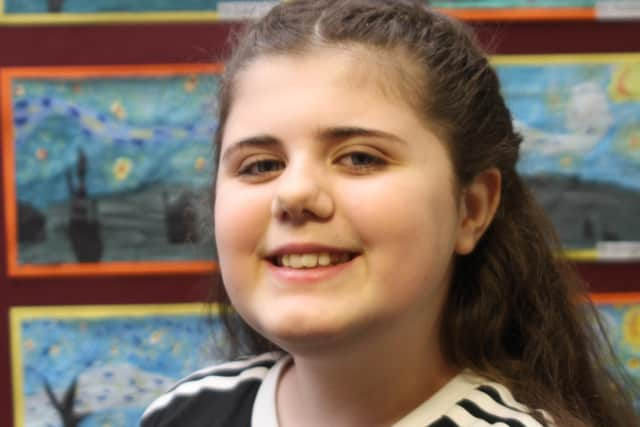Leeds pupil who had open heart surgery as a baby taken on virtual reality journey through the heart with her classmates
When Imogen Tankard was just six-months-old, doctors discovered she had a complex heart problem that left her clinging to life and her family fearing the worst.
Diagnosed with cor triatriatum, a rare condition which caused her heart to struggle to function correctly, she underwent major open heart surgery after her parents were devastated to be told their baby could just have hours to live.
Advertisement
Hide AdAdvertisement
Hide AdImogen, now aged 11, survived thanks to research, and she and her family have been fundraising for Heart Research UK ever since.


Last month, the national charity partnered with her Leeds primary school to deliver a series of virtual reality-based lessons taking Imogen and her classmates on a simulated journey through the heart.
The Year 6 pupil says it helped her to understand her own heart condition and what happened to her during her surgery.
“And I also learnt about the different parts of the heart which was really good. It’s really helped me understand my own heart condition and the process of how the heart works.”
Advertisement
Hide AdAdvertisement
Hide AdImogen’s class at Adel St John the Baptist Church of England Primary School took part in the charity’s Schools Programme, which teaches children about the heart through virtual reality and computer games.
As well as looking at the structure of the organ, the scheme teaches children about how to make healthy choices when it comes to food and exercise.
“I definitely loved the VR, because it was very funny,” Imogen says. “We just had a laugh with that and obviously we learnt a lot as well.
“It looks so funny when someone else is wearing the headset and you can see them looking around the room. Then when you’re doing it, you look just as silly!”
Advertisement
Hide AdAdvertisement
Hide AdThe programme is designed to be a fun and engaging one. But it is one that also has an important message, as Holly Fleetwood, Heart Research UK’s health promotion and education specialist, explains.
“We believe that in order to reduce the risk of developing heart disease, education about lifestyle factors such as diet, physical activity and the impact of smoking, are best learnt by children from a young age,” Holly says.
“This enables them to put healthier lifestyle practices into place early on, to go home to their families and promote these behaviours, and consequently reduce the risk of developing heart disease.
“Research has shown that playing games surrounding the subject you are learning re-enforces the content you have been taught, as well as creating a positive connection with the subject.
Advertisement
Hide AdAdvertisement
Hide Ad“We created these lessons with more exciting technology in the classroom to enhance child learning and make science lessons more fun.”
Imogen’s teacher Heather Fountain found out about the charity’s Schools Programme and it is her Year 6 class that has taken part. “Because it’s so different it’s been really exciting for them,” Heather says.
“A lot of them had never used VR headsets before and I’ve never worked with them before... It’s made the learning kind of come to life for them.
“It’s been really good for different types of learners. Some [pupils] learn better from just getting the facts given to them or having a Power Point that they can read from, but this is giving that practical element to some of the children who find reading slides a little bit more complicated or harder to remember.
Advertisement
Hide AdAdvertisement
Hide Ad“So here they’ve learnt the information, the theory, and then they’ve gone away and seen it in reality. They’ve done a lot of work with each other as well.
“So there’s always been someone else to bounce ideas off of and share their understanding with, which helps lots of different children with different abilities.”
Imogen is pleased she and her classmates have learnt more about the heart and hopes other schools will too, so that more children can understand about heart conditions.
Being just a baby at the time, she doesn’t remember her heart problem but she does recall how for several years afterwards she would often be poorly “because my immunity wasn’t very good”.
Advertisement
Hide AdAdvertisement
Hide AdHer condition was so rare that Leeds General Infirmary, where she had her operation, only treats cases like it once every three or four years. Imogen still has check-ups at the hospital and says doctors have advised her of various risk factors.
“So in Year 4, which was my last appointment, two years ago, they told me that I wasn’t allowed to get my ears pierced or to ever get a tattoo, obviously when I’m older, not now,” she explains.
“So I’m not allowed anything like that, cause then I could be at risk of having more problems with my heart. I’m not meant to get too cold, in cold water and things like that. I do get ill more. If something’s going around, I will get it. But I won’t just get it, I get it bad.”
Imogen is a young supporter of Heart Research UK, which funds pioneering medical research into the prevention, treatment and cure of heart disease, and has taken part in a number of fundraising events to help the charity.
Advertisement
Hide AdAdvertisement
Hide AdShe says: “Even though I have a heart condition, even though I have things I need to do to stay healthy, I can still live my life, with the help that Heart Research UK has given me.”
Visit heartresearch.org.uk
Support The Yorkshire Post and become a subscriber today. Your subscription will help us to continue to bring quality news to the people of Yorkshire. In return, you'll see fewer ads on site, get free access to our app and receive exclusive members-only offers. Click here to subscribe.
